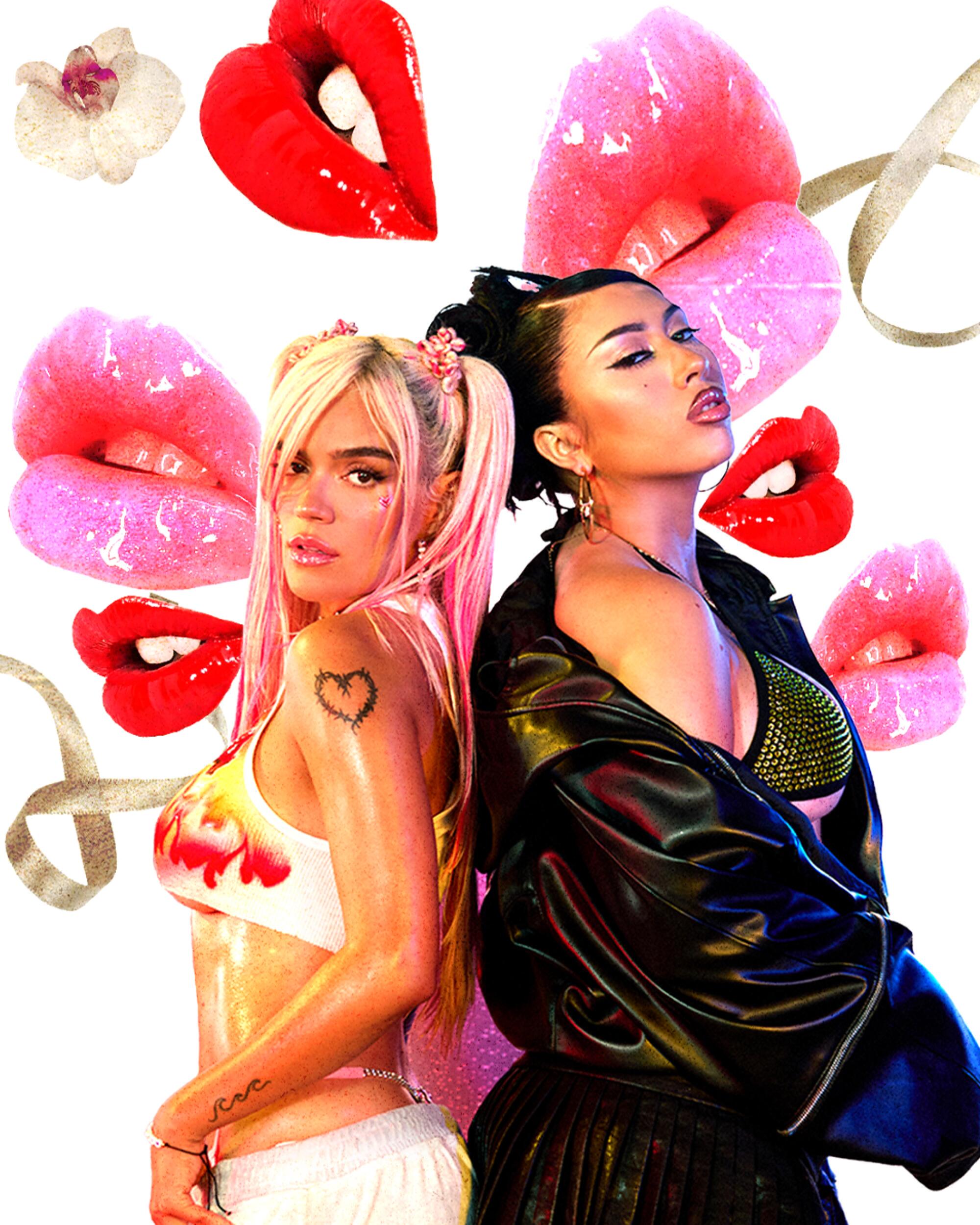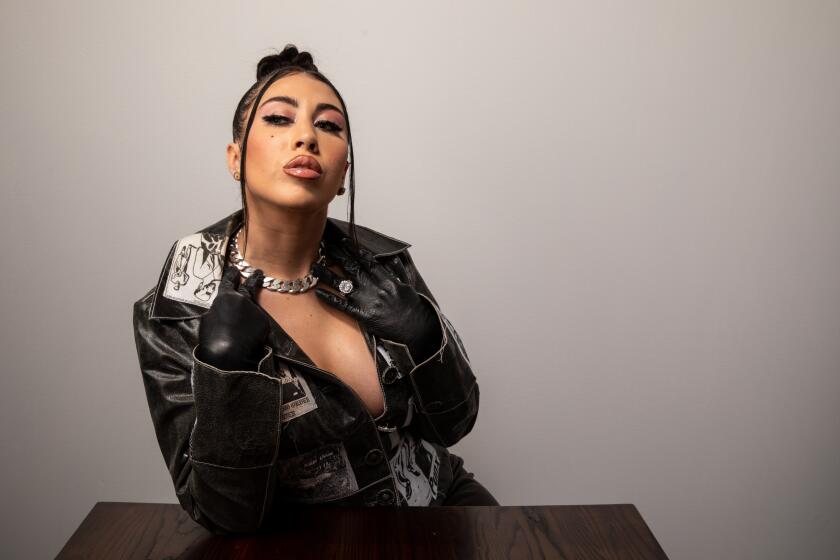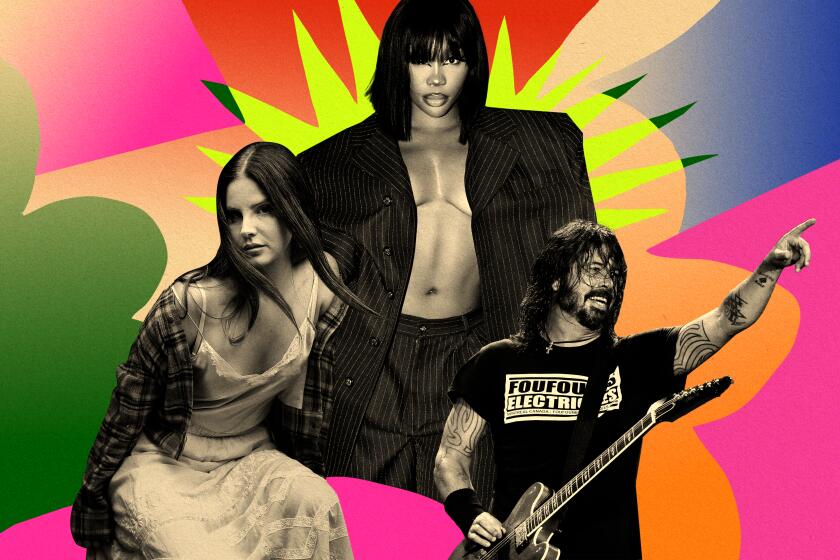
- Share via
Kali Uchis has played many different women in her 29 years on Earth.
In the lead-up to her 2018 debut, “Isolation,” the Grammy-winning singer-songwriter made a name for herself as an edgy soulstress who could rock with Bootsy Collins, Damon Albarn and Juanes — in both English and Spanish — without missing a beat.
The Colombian-American singer has released her first Spanish-language album, one that pays homage to her musical heroines while challenging cultural barriers.
In her 2020 follow-up, “Sin Miedo (del Amor y Otros Demonios)” — her first primarily Spanish-language LP — Uchis played a cosmic siren who stepped into her star power with her colossal breakout hit, “Telepatía.” In her 2023 album, “Red Moon in Venus,” she evolved into a sage of love, letting karma take the wheel in enlightened R&B ballads like “I Wish You Roses” and “Moral Conscience.”
With her new Spanish-language album, “Orquídeas,” out this week on Geffen Records, Uchis humanizes the divine feminine avatar she’s developed in her previous works. With splashy cameos from Karol G, Peso Pluma, Rauw Alejandro, El Alfa and JT of City Girls fame, she blooms wildly.
Our top albums of 2023 come courtesy of a diverse group of women: an R&B superstar, a rising Colombian American and a sassy country newcomer.
I last met Uchis one mid-September evening in Los Angeles, where she gave an intimate live performance at the Grammy Museum. The star surfaced demurely from her dressing room and took the stage — not in her usual hip-hugging finery, but in a tiered yellow maxi dress. Photos were strictly prohibited, as was the typical after-show meet-and-greet. She sang a jazzy, slow-burning cover of Nancy Sinatra’s 1966 classic, “Bang Bang (My Baby Shot Me Down),” before absconding quietly backstage.
Months later, she reveals to me over the phone that she’s playing a new role this year: that of a mother.
“I just thought I was putting on a bit more gut than usual,” she says with a laugh. “But motherhood is definitely something I always wanted to experience. I feel ready for it. I’ve done a lot of necessary healing on myself in the last year. I got sober. I decided to clear myself spiritually, mentally... and, well, that’s when I got pregnant.”
Uchis made the discovery not long before embarking on the second leg of her Red Moon in Venus tour in late September. Her first concern, she says, was the possibility of having to cancel those shows and let down her fans, whom she lovingly calls “Kuchis.” She also worried about sacrificing her hard-won privacy, most evident by her barely there presence on social media.
She decided to continue the tour, which culminated in a majestic grand finale at the Hollywood Bowl. And with the support of her boyfriend, Houston-born rapper Don Toliver, she kept her pregnancy under wraps for months; the couple made a joint announcement Thursday morning in the video for her glossy bolero-pop ballad, “Tu Corazón es Mío,” and its spirited companion, “Diosa.”

“We always talked about wanting to have a kid, so we were really happy,” she says. “[But] I didn’t want to share that journey with just anybody. There’s so many people out there, even within my own family, that don’t wish me well. I didn’t want anybody to know until I felt that my pregnancy was viable. Ask any pregnant woman [why] they’d want to keep it private. It’s such a vulnerable situation.”
Kali Uchis was born Karly-Marina Loaiza in Alexandria, Va. She spent her early childhood in her father’s hometown of Pereira, Colombia, where she studied reading and writing in Spanish and learned spiritual practices from her grandmother, a shaman. Her family eventually settled back in Virginia, where as a teen, she spent her free time playing saxophone in her high school jazz band and producing her earliest tracks on a laptop. Her father, who worked as a building superintendent, bought a tape recorder to keep track of repairs; Kali used it to record herself singing sketches of songs.
But love was sparse in her family home and conflicts were frequent.
“I have mother wounds and father wounds that I’m working on in therapy,” she says. “I’m learning to recenter my idea of what family is. It’s super important to heal as much as you can before you bring a child into the world, so you don’t unconsciously put your s— on them.”

Uchis left home at age 17 and decided to pursue a music career. In 2012 she uploaded her DIY mixtape, “Drunken Babble,” to the hip-hop audio platform DatPiff; and in 2015, she self-released “Por Vida,” an EP of psychedelic doo-wop fusions, featuring blog-era titans Kaytranada, BadBadNotGood and Tyler, the Creator. Kali eventually signed to Virgin EMI Records, a U.K.-based subsidiary of Universal Music, and released “Isolation” in partnership with the London label Rinse in 2018.
Yet the subterranean tension between her Colombian and American identities would beset her professionally. It was while writing “Sin Miedo” that the limits of the music industry began to disrupt her creative flow — and performing as her natural self in Spanglish began to feel like stepping on too many toes.
Despite Universal having its own Latin division, the two operate separately; and under Uchis’ contract, she discovered, only songs recorded in English counted toward her contractual obligations. (She and her lawyer would later renegotiate the terms.)
“Moving in between languages, and being such a versatile artist in general, can be really exhausting,” says Uchis, echoing the cries of many other “200-percenters,” or U.S.-born Latines pressured to split their personalities across cultural lines. “It feels like working overtime.”
Get the Latinx Files newsletter
Stories that capture the multitudes within the American Latinx community.
You may occasionally receive promotional content from the Los Angeles Times.
Although the music industry’s stark division between Anglophone and Spanish-language markets hasn’t stopped artists like Shakira or Ricky Martin from achieving global stardom, it‘s still put a massive burden on Latines to record twice the material to placate English-language consumers. Despite Uchis’ ability to groove seamlessly between languages and genres in the same song — tapping multiple markets in the process— she says that until recently, her talents were written off as too “niche” to sell.
“To take ‘Telepatía’ to the Latin radio, [the label] told me I would have to use different drums,” she recalls. “I said no, and the radio still took it. That means a lot to me, because it means I can open doors for others and expand what it means to make popular music today. Our music can extend beyond the niche.”

The systemic bias of the music industry may be a burden, but it hasn’t completely kneecapped Uchis on her road to fame. Compared to most young artists of Latin American heritage, she performs exceedingly well in both markets: Her 2017 collaboration with Juanes earned her a coveted nomination at the 2018 Latin Grammys, and in 2021, her single “10%,” a 2019 collaboration with Kaytranada, won her the Grammy for dance recording. “Telepatía,” which notably took off without a musical male chaperone, made her the first female soloist to top Billboard’s Hot Latin Songs chart in nearly a decade. “Red Moon in Venus” debuted at No. 4 on the U.S. Billboard 200 in March.
It was in the making of “Orquídeas” that Uchis decided to put her Latin industry bona fides to the test. “In the Latin market, this is only my second album,” she says. “To them, I’m still a new artist.”
Written concurrently with “Red Moon in Venus,” “Orquídeas” was mostly recorded and arranged at her home in the San Fernando Valley from 2021 to 2022. She became long-distance pen pals with some of Latin music’s biggest and brightest stars, swapping tracks with them via emails and DMs in lieu of faraway studios. The process was not just validating to her as a Latina but also as the arbiter of her own creative destiny.
“I’m very much a homebody,” she says. “I’ve been doing this long enough that I’m not about to be bouncing all over the city anymore. I know how to arrange everything myself.”
But her remote approach also yielded some fabulous surprises — take JT rapping the nursery rhyme “Sana sana, colita de rana,” over the brisk reggaetón bounce of “Muñekita.” (“I wrote her part in the shower,” says Kali.)
Another shocker was Peso Pluma crooning brightly on Uchis’ disco cut, “Igual que un Ángel.”
“I sent him that song for s— and giggles,” she says. “But he was so excited to do something different, and it came out good. He really did his thing!”

If Uchis harbored any reticence to releasing a song, she says, it was her 2023 pop-reggaetón scorcher “Labios Mordidos” an unblushing assertion of her bisexuality.
“I never had a song where I fully talk about girls in Spanish, so this was just the moment for me,” she says. “Growing up Latina and bisexual, I never saw that represented. I try to be the person that I would have wanted to see growing up.”
Uchis says she introduced the song to Colombian superstar Karol G, a vocal LGBTQ+ ally, in 2021, but she admits she was braced for homophobic backlash. The two tabled it until 2023, when the climate in the Latinosphere became much more favorable for women loving women openly in reggaetón. With the advent of queer artists like Tokischa, Young Miko and Villano Antillano, the industry seemed warmed up for a song like “Labios Mordidos,” which includes lines like “Esta noche soy lesbiana / Tú me das las ganas.”
Over two shows at the Rose Bowl, Colombian singer Karol G held one big therapy session with her fans
The music video, which was shot in suburban Miami, follows a bacchanalian Y2K house party, inspired by Pharrell’s 2003 video for “Frontin’.” There, Uchis and Karol are encircled by beautiful women kissing, grinding, skateboarding and — with a nod to Christina Aguilera’s sex-positive anthem from 2002, “Dirrty” — boxing each other in an underground ring. “Ese tatuaje en la espaldita me dejó sin aire,” purrs Karol.
“I wanted to make something fun and girly,” says Uchis. “Just celebrating Latinas, celebrating women. To fully just go there with it and get a little nasty and freaky with it.”
As she predicted, though, much of the praise from her fans was interspersed with hostility — namely against women exercising their sexual agency, enthusiastically and independently of men.

“My fan base loves that,” says Uchis. “But introducing this to a bigger audience meant seeing stuff like, ‘Ew. So vulgar. Why are women singing about women like this?’ Now when a man sings like that about women, it’s fine. For instance, there are many popular Latin songs about girls being with older men. So you’re OK with girls being groomed? And pedophilia? But when a girl sings about another girl, that’s where we’ve crossed the line in this community?
“It’s why I really appreciate that Karol ended up going for ‘Labios Mordidos,’” Uchis adds. “She’s a huge artist globally, but especially in Latin America. There’s a lot of risk that comes with doing a song like that.”
Uchis already has a follow-up album to “Orquideas” in the works, which she describes as a more down-tempo exploration of her “emo side.” Not the My Chemical Romance brand of emo, she stresses; but currents of alt-rock moodiness are to be expected. And as with any Kali Uchis record, she promises to keep flouting industry standards and forging new paths forward for Latinas in music.
“I try to remind myself that I’m a lot stronger than the people who set out to tear me down. That’s the most important thing.”
More to Read
The Latinx experience chronicled
Get the Latinx Files newsletter for stories that capture the multitudes within our communities.
You may occasionally receive promotional content from the Los Angeles Times.










